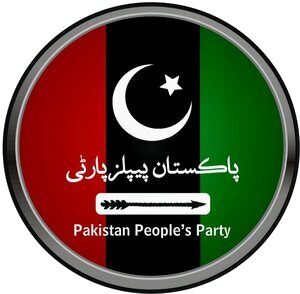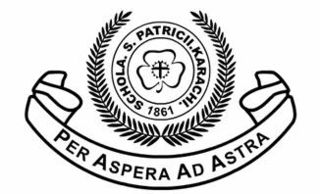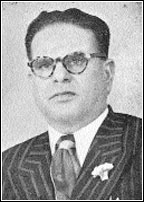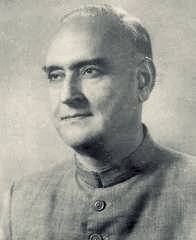Related Research Articles

West Pakistan was the western province of Pakistan between 1955 and 1970, covering the territory of present-day Pakistan. Its land borders were with Afghanistan, India and Iran, with a maritime border with Oman in the Gulf of Oman in the Arabian Sea.

The Pakistan People's Party is a centre-left political party in Pakistan, currently being the largest in the Senate and second-largest party in the National Assembly. The party was founded in 1967 in Lahore, when a number of prominent left-wing politicians in the country joined hands against the rule of Ayub Khan, under the leadership of Zulfikar Ali Bhutto. It is affiliated with the Socialist International. The PPP's platform was formerly socialist, and its stated priorities continue to include transforming Pakistan into a social-democratic state, promoting egalitarian values, establishing social justice, and maintaining a strong military. It, alongside the Pakistan Muslim League-Nawaz and the Pakistan Tehreek-e-Insaf, is one of the three largest political parties of Pakistan.

The Pakistan Muslim League Urdu: پاکستان مسلم لیگ (ق); Pākistān Muslim Līg (Qāf), Acronyms: PML(Q), PML-Q, PMLQ, "Q League" is a political party in Pakistan. As of the 2024 parliamentary election, it has a representation of five seats. It previously served as an ally of former prime minister Raja Pervez Ashraf's government, and led a joint election campaign in 2013 alongside Pakistan Peoples Party (PPP) in Punjab and Balochistan provinces against its rival Pakistan Muslim League (N), a fiscally conservative and centre-right force.

The Pakistan Muslim League, is the name of several different Pakistani political parties that have dominated the centre-right platform in the country.
Shah Nawaz Bhutto, 8 March 1888 – 19 November 1957, was a politician and a member of Bhutto family hailing from Larkana in the Sind region of the Bombay Presidency of British India, which is now Sindh, Pakistan.

Mian Iftikharuddin was a Pakistani politician, activist of the Indian National Congress, who later joined the All-India Muslim League and worked for the cause of Pakistan under the leadership of Muhammad Ali Jinnah. He was known for his left-wing politics and briefly served as the Provincial Minister for Rehabiilitation of Refugees in Punjab.

St Patrick's High School is a Catholic primary and secondary school located in Saddar Town, Sindh, Karachi, Pakistan. Founded by the Jesuits in 1861, the school is the second-oldest school in Karachi. Since 1950, it has been run by the diocesan clergy of the Archdiocese of Karachi.

Fatima Jinnah was a Pakistani politician, stateswoman, author, and activist. She was the younger sister of Muhammad Ali Jinnah, the founder and first Governor-General of Pakistan. She served as the Leader of the Opposition of Pakistan from 1960 until her death in 1967.

General elections were held in Pakistan on 7 December 1970 to elect members of the National Assembly. They were the first direct general elections since the independence of Pakistan and ultimately the only ones held prior to the independence of Bangladesh. Voting took place in 300 general constituencies, of which 162 were in East Pakistan and 138 in West Pakistan. A further thirteen seats were reserved for women, who were to be elected by members of the National Assembly.
Ali Muhammad Rashdi (Urdu: پیر علی محمد راشدی was a Pakistani writer, journalist, politician, parliamentarian, and diplomat. Notably, he served as Pakistan's ambassador to the Philippines from 1957 to 1961 and to China from 1961 to 1962. Rashdi also held ministerial positions in Sindh and served as the central minister for information and broadcasting. He was the elder brother of scholar Hassam-ud-Din Rashidi.
Sir Ghulam Hussain Hidayatullah KCSI was a colonial Indian and Pakistani politician from Sindh. He held several offices in Sindh including 1st Chief Minister (1937–1938) and being re-elected as 5th Chief Minister (1942–1947).
Muhammad Yusuf Abdullah Haroon was a Pakistani businessman and politician who served as the 5th Governor of West Pakistan and 3rd Chief Minister of Sindh.

Muhammad Hashim Gazdar was one of the three representatives from Sindh to the Constituent Assembly of Pakistan, and the second Deputy Speaker of the National Assembly of Pakistan.

The Muhajir people are Muslim immigrants of various ethnic groups and regional origins, and their descendants, who migrated from various regions of India after the 1947 independence to settle in the newly independent state of Pakistan. The community includes those immigrants' descendants, most of whom are settled in Karachi and other major urban centres of Pakistan.

Mahmud Husain Khan was a Pakistani historian, educationist, and politician, known for his role in the Pakistan Movement, and for pioneering the study of social sciences. He served as Minister for Kashmir Affairs from 1951 to 1953 and Minister for Education in 1953, as well as minister of state in Pakistan's first cabinet under Prime Minister Liaquat Ali Khan.

Sir Abdullah Haroon was a British Indian politician and businessman who made major contributions towards developing and defining the role of Muslims in economic, educational, social and political fields in the Indian subcontinent.

Abdul Ghafoor Bhurgri, was a lawyer, writer and politician from Larkana, Pakistan.
References
- ↑ Siddiqi, Muhammad Ali (2023-04-27). "First resolution". DAWN.COM. Retrieved 2024-11-19.
- ↑ Ali, Zahid (2021-07-01). "The All-India Muslim League's Battle for Pakistan in Sindh 1937-1947: Quaid's Strategies and Policies. | EBSCOhost". openurl.ebsco.com. Retrieved 2024-11-19.
- 1 2 Paracha, Nadeem F. (2017-01-26). "The Muslim League: A factional history". DAWN.COM. Retrieved 2024-11-18.